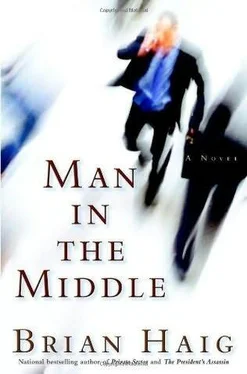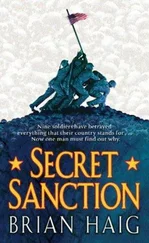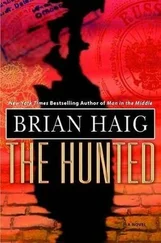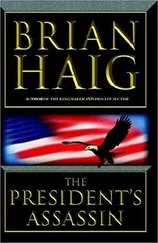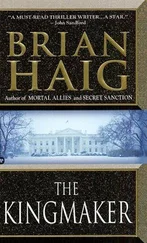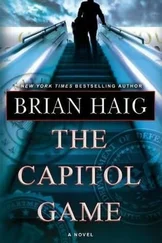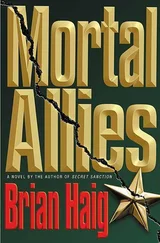Brian Haig - Man in the middle
Здесь есть возможность читать онлайн «Brian Haig - Man in the middle» весь текст электронной книги совершенно бесплатно (целиком полную версию без сокращений). В некоторых случаях можно слушать аудио, скачать через торрент в формате fb2 и присутствует краткое содержание. Жанр: Триллер, на английском языке. Описание произведения, (предисловие) а так же отзывы посетителей доступны на портале библиотеки ЛибКат.
- Название:Man in the middle
- Автор:
- Жанр:
- Год:неизвестен
- ISBN:нет данных
- Рейтинг книги:4 / 5. Голосов: 1
-
Избранное:Добавить в избранное
- Отзывы:
-
Ваша оценка:
- 80
- 1
- 2
- 3
- 4
- 5
Man in the middle: краткое содержание, описание и аннотация
Предлагаем к чтению аннотацию, описание, краткое содержание или предисловие (зависит от того, что написал сам автор книги «Man in the middle»). Если вы не нашли необходимую информацию о книге — напишите в комментариях, мы постараемся отыскать её.
Man in the middle — читать онлайн бесплатно полную книгу (весь текст) целиком
Ниже представлен текст книги, разбитый по страницам. Система сохранения места последней прочитанной страницы, позволяет с удобством читать онлайн бесплатно книгу «Man in the middle», без необходимости каждый раз заново искать на чём Вы остановились. Поставьте закладку, и сможете в любой момент перейти на страницу, на которой закончили чтение.
Интервал:
Закладка:
Tirey stopped about a foot from his desk and flashed a phony piece of paper and a real shield in his face. He identified himself and said very forcefully, "I have reason to suspect that somebody in this office is involved with a kidnapping. This warrant authorizes my agents to conduct a search."
The space we had entered was a large anteroom that was messy and disorganized, with about seven desks, behind each of which sat an Arab gentleman, dressed, as was the receptionist, in severe business attire. It smelled of stale cigarettes and old teabags, and looked like a cross between a ward politician's back room and a busy mortuary. Tirey instructed the receptionist, "Tell your people to leave their desks and stand against that wall." He pointed at a wall. "If anybody touches anything, they'll be cuffed and arrested."
Apparently they all spoke English, or they knew the drill, because they began standing, hanging up phones, dropping pens, and stepping away from their desks.
I asked the receptionist, "Is Mahmoud Charabi in?"
We had checked beforehand and confirmed that indeed, he was at that moment in his office. Still, it was instructive to see the look on this poor man's face. Unlike his boss, this guy must've hung around during Saddam's reign, because the sudden appearance of armed men bearing legal papers and threats put a very worried expression on his face. He replied hesitantly, "I… I do not know this."
I pointed at the phone on the desk. "Tell him Colonel Drummond from the American Army wants a word with him. Now."
He lifted up the phone and punched a number. He spoke in Arabic, but whatever he said took a lot longer than what I said. For all I knew, Charabi's office had a fire escape, and this guy was telling his boss to make tracks.
It was time to make my move; there were two doors on the far side of the room and I walked swiftly toward them. I opened the first door, which turned out to be a toilet, and then I threw open the second door, which turned out to be the devil's lair, and I entered. The door had a switch lock, and to ensure I wasn't disturbed, I shut the door gently behind me, turned the switch, and then turned around and faced my enemy.
A man sat behind a medium-size wooden desk in an office that was neither large nor even well-furnished-it contained only the aforementioned desk, a metal file cabinet, a badly stained wall-to-wall carpet, and Mahmoud Charabi sipping a cup of tea. This was hardly what he had schemed and plotted for decades to end up in, but that was the whole point; this room was a way station, and if things worked out, his next office would be palatial in size and decor, he would have an army at his beck and call, and a nation at his feet.
He stared at me a moment, hung up the phone, started to stand, then changed his mind and fell back into his chair. That moment of indecision aside, he had enough presence of mind to demand, "Why do you wish to see me? You have no appointment."
I moved toward his desk. A rotating chair was positioned in the middle of the floor that looked like, and probably was, U.S. Army property, which I interpreted as permission to sit, and I did.
He suggested, "I think you should leave." After a moment in which I did not leave, he informed me, "Now I am calling the American ambassador to protest." He lifted up the phone and began hitting numbers with angry little punches.
There are two ways to approach a delicate situation such as this; diplomacy is the recommended course for all the obvious advantages that it avoids nasty confrontations, often gets results, and leaves no ugly feelings. And to be fair, the man to my front was perhaps weeks away from becoming the most powerful man in this country, and as such, he deserved my respect and courtesy, if not for himself, then for the office within his grasp. Also he had powerful friends in Washington who could screw up my paycheck, my career, or worse.
That, however, has never been my way and I said, "Put down that phone."
He continued dialing.
I said, "Go ahead, then. It's your funeral."
He stopped dialing. I seemed to have his attention and he asked, "What are you talking about?"
"Well… for starters, who murdered Clifford Daniels? Then, who told the Iranians that we broke their intelligence code? And finally, who shot and kidnapped an American Army major? There's more, but I think that's a good beginning. Don't you?"
Somewhere in there I struck a chord, or several chords. His face went white. He said, "I… I have no idea what you're talking about. W-who are you… and w-who sent you?"
I ignored his questions and said, "Ordinarily, at moments like this, I would read you your rights and advise you to get a lawyer. But today, I'm your lawyer. And today, you have no rights, only options." I paused, then briefly explained why he should pay attention to these options. "I can destroy you with one phone call."
Mahmoud Charabi, incidentally, was in his late fifties, medium height, and a bit on the plump side-pampered and soft-looking, actually-which did not reinforce the tough-guy expression he was trying to give me. He had graying hair around a bald dome, waxy flesh around a formless face, thick lips around a tight mouth, and full cheeks around small brown eyes that were staring at me a little incredulously. The overall impression was a sort of roundness and flabbiness, which might be why people underestimated this man.
Also he possessed excellent English and was fairly well-spoken, but with a discernible accent, and I detected a slight stutter, perhaps a nervous affliction. To tell the truth, nothing about him looked powerful, charismatic, or even slightly imposing. He looked more like an overweight insurance adjustor than the George Washington of this country. Probably this accounted for why he was trying to lie, scheme, and murder his way into power.
Also he had the unfortunate Nixonian reflex of squeezing his hands together at moments of high stress-at that moment, he looked like he was pressing coal into diamonds.
Lest he harbored any doubts, I informed him, "I have Clifford Daniels's laptop computer." His eyes widened, and to confirm his worst fears, I continued, "You're Crusader Two. And yes-Clifford was both stupid and sloppy. Because, yes, he failed to eliminate the e-mail messages. And yes, Mr. Charabi, they were decoded, and they are very… incriminating. Message after message."
"But they-"
Not allowing him to get a word in, I continued, "Imagine, if you will, how those messages will look on the front page of the New York Times." He began contemplating the empty blotter on his desk, and in case he forgot, I reminded him what he had written, saying, "Those unflattering assessments of your fellow leaders here in Iraq. Your whiny complaints about the American Army and the American ambassador-'dickhead'?… Do you think he'll be flattered by that nickname? I don't. And best for last: You and Cliff cooking up that deal to tell the Iranians we had broken their code."
When he made no response, I said, "Wow. I mean, wow. How is that going to look?"
If his face had looked white before, he now was on the verge of disappearing into thin air. He never imagined he would hear these words; he thought Daniels was dead, that his secrets went to the grave. He said, "Uh… w-who… please, who are you?"
"It doesn't matter. Major Bian Tran will be brought to this office immediately. You have ten minutes, or…" I allowed that thought to drag off.
He looked up at me, very surprised. "I… I… w-what? I have never heard of this… major… what did you say is her name?"
I stood up and leaned over his desk. "On your orders, her vehicle was ambushed yesterday evening. She was wounded and kidnapped." We locked eyes. "If she's dead, you're dead. I'll kill you myself." I pointed at my watch. "Nine minutes."
Читать дальшеИнтервал:
Закладка:
Похожие книги на «Man in the middle»
Представляем Вашему вниманию похожие книги на «Man in the middle» списком для выбора. Мы отобрали схожую по названию и смыслу литературу в надежде предоставить читателям больше вариантов отыскать новые, интересные, ещё непрочитанные произведения.
Обсуждение, отзывы о книге «Man in the middle» и просто собственные мнения читателей. Оставьте ваши комментарии, напишите, что Вы думаете о произведении, его смысле или главных героях. Укажите что конкретно понравилось, а что нет, и почему Вы так считаете.
